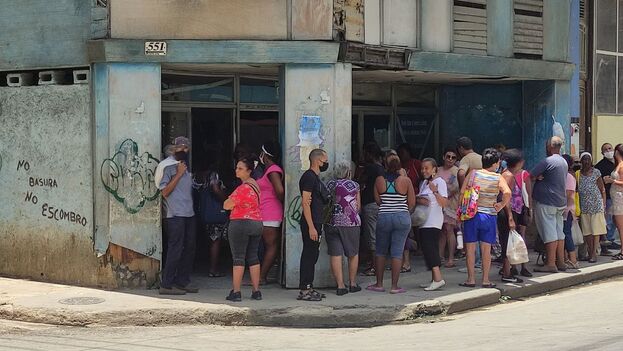
![]() 14ymedio, Natalia López Moya, Havana, 24 November 2022 – Ricardo, 77, rose that morning in good spirits, not imagining the awful surprise that awaited him in the grocery store where he went to buy his rations for November: “I can’t serve you because you’ve been reported dead”, the assistant replied after being given his ration book.
14ymedio, Natalia López Moya, Havana, 24 November 2022 – Ricardo, 77, rose that morning in good spirits, not imagining the awful surprise that awaited him in the grocery store where he went to buy his rations for November: “I can’t serve you because you’ve been reported dead”, the assistant replied after being given his ration book.
Three days and many formalities later, this habanero pensioner was finally able to prove that he was still alive.
The store assistant had explained that he needed to go to the Consumer’s Registry Office (Oficoda) with his ID card, his ration book and any evidence that proved that he hadn’t died. The scene was like it was lifted from the black comedy Death of a Bureaucrat (1966), but instead of happening on the cinema screen it was happening right there in Havana in 2022.
“I went to Oficoda and they repeated that in their records my ration book registration was circled, with a number “1”, and it appeared that I was dead”, Ricardo told 14ymedio. “It was a really absurd situation, because how are you supposed to prove to an official that you’re alive, if not just to walk up to her and talk, and ask questions”, he joked. “In the end I moved up closer to the woman and asked her: Miss, do I smell like I’m dead?”
Joking aside, correcting the error not only took Ricardo quite some time, and a ton of paperwork, but he also had to postpone getting his quota of rice, cereal and other produce. “While I was there in the Oficoda another three people arrived who were in the same situation. Two had been taken for having died and the other one for having emigrated”, he said.
The process of digitalisation of data at Oficoda started in 2018. Although at first the authorities presented this process as a means to speed up and improve the procedures offered to the population, the truth is that their real objective was to identify relatives of deceased or emigrated individuals who continued to buy food rations in their place.
The obligation to cancel the ration book of a deceased or emigrated person isn’t a particularly new or original one. Resolution 78, passed by the Ministry of Interior Commerce in 1991, imposes this rule on people who are in prison, in care homes, in long-term hospitalisation or resident abroad for more than three months, and they have between ten and sixty days to be taken off the ration book system.
However, the rule has hardly been applied for decades, and this has contributed to the existence of thousands and thousands of “ghost consumers”. In 2021 alone, in the province of Ciego de Ávila, 15,000 of the 437,000 registered total no longer even lived in the country, according to data from the Department of Identification, Immigration and Alien Status published in the official press. This phenomenon applies across the whole Island and has gotten worse in recent months, with the massive exodus of people from the country.
With Cuba’s economic crisis and its lack of currency for buying products abroad, Oficoda has tightened up its investigations into the existence of these ‘ghost consumers’. The digitisation of its register will certainly have helped in this process, but errors, and the reliance on unchecked information from store managers or other consumers, along with corruption itself, have all left a substantial and continuing potential for irregularity.
Ángela, a resident of Luyanó, Havana, told this newspaper: “They managed to duplicate my ration book. I went to sort something out at Oficoda and when they put in my family data they found there was a duplicate book”. Up until then somebody else had been buying bread and other regulated food products designated to Ángela and her family members, but no one had noticed it.
“I don’t have a photocopier in my house for making a copy of the ration book. So who did that?”, she complained. But the official just answered vaguely, “There must have been an error during the digitalisation process”. During the hour and a half that Ángela spent at the centre trying to sort out the problem, at least two others arrived with similar problems. They were all given the same excuse about probable errors in digitisation.
It isn’t just a routine problem to have your ration book duplicated or to be removed from the system because you’re presumed dead — it becomes a real headache for victims. This document, which has been used by every Cuban since as long ago as 1962, has actually gained in significance in the area of state commerce in recent years. Instead of disappearing, as optimists had predicted, these days it has become indispensable for obtaining products which until recently were on sale more freely.
“Being presumed dead not only stops me from buying the regulated amounts of rice or coffee, but also from getting a packet of chicken or even a bit of washing powder”, says Ricardo. Ever since that fateful morning, every time he wakes up he looks closely at himself in the mirror, touches his chest, breathes in and tells himself, with some relief: “I’m alive. And I hope Oficoda knows it too!”.
Translated by Ricardo Recluso
____________
COLLABORATE WITH OUR WORK: The 14ymedio team is committed to practicing serious journalism that reflects Cuba’s reality in all its depth. Thank you for joining us on this long journey. We invite you to continue supporting us by becoming a member of 14ymedio now. Together we can continue transforming journalism in Cuba.
